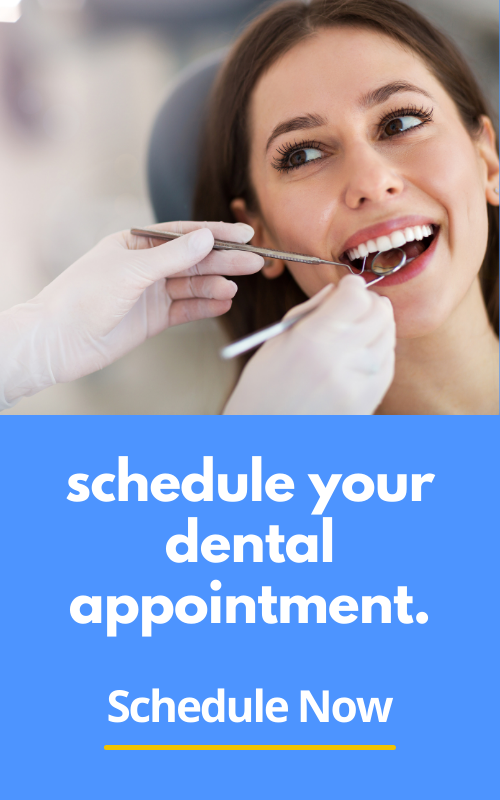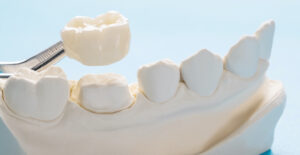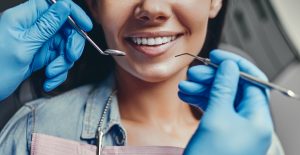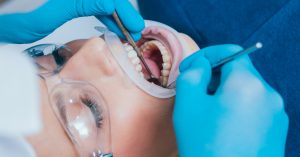If you happen to suffer from tooth sensitivity, you’re not alone, 1 in 8 people suffer from tooth sensitivity, and you know well how uncomfortable and painful it can be. Sensitive teeth can be caused by a variety of factors, including lifestyle habits, over abrasive tooth brushing, or even a common dental condition. Sensitive teeth can cause sharp or shooting pains, but the good news is there are many home and professional remedies that can reduce or even eliminate your tooth pain. Commonly used products like over-the-counter Sensodyne toothpaste or a professional fluoride treatment can help you with your symptoms. Here we help you identify the possible cause of your sensitive teeth syndrome and how you can stop the pain.
The right toothbrush and toothpaste
It is really common for dentists to find that patients are brushing their teeth and gums too aggressively or using an abrasive toothpaste. It seems logical to brush with vigor to remove plaque and food debris, but the truth is, you should be brushing gently with a soft or extra soft-bristled toothbrush and non-abrasive toothpaste. Using a medium or hard bristled brush can cause damage to your teeth by permanently wearing away gum tissue or tooth enamel, leaving your teeth and gums sensitive and painful to stimuli like cold air or foods and beverages.
Instead, opt for a soft bristled toothbrush that is approved by the American Dental Association (ADA) from reputable brands like Oral-B and Colgate. There are so many toothpastes to choose from, but you should stay away from ones with abrasive properties, particularly ones like charcoal paste. These can only cause pain and potential problems because they are too harsh for tooth enamel. Proper brushing technique and a good toothpaste are great ways to prevent the process of tooth sensitivity.
Custom made night guards
Many patients report they grind and clench their teeth while sleeping, which not surprisingly can cause a lot of tooth damage. Chronic grinding from either a bite problem, sleep disorder, airway issues or taking certain medications has a large impact on your teeth. It causes wearing away of tooth enamel, leaving the tops of your teeth a darker hue or more yellow. This can cause a change in your bite (collapsed bite), and also leave you with increased tooth sensitivity and pain.
What can you do to stop tooth sensitivity? Discuss with your dentist your habits and any medication that you take that may contribute to teeth grinding. Your dentist may have you discuss other medication options with your physician. Many patients need a custom night-guard to help cushion their teeth from clenching at night to protect their teeth and jaw. A night-guard is an affordable, non-invasive way to help manage your pain symptoms. It is made by taking an impression of your teeth and a lab designing a mouthpiece to accurately fit your teeth and jaw to give you the protection you need.
Mouthwash
Some mouthrinses are not always the best option because they contain abrasive ingredients for teeth whitening. Dental products that contain whitening ingredients are often more abrasive and can weaken enamel. While they are billed as great for brightening a smile, they can cause permanent damage.
Instead, opt for a fluoridated mouthwash or mouth rinse that can reduce sensitivity if you use them daily. Fluoride helps strengthen tooth enamel and prevent tooth decay. You also want to check that your mouthrinse is alcohol free since alcohol can dry your mouth and leave you with greater sensitivity.
Mouthwash like ACT or Listerine Total Care Zero Alcohol Fluoride Mouthwash are great options for affordable, over-the-counter dental products. They both contain the necessary ingredients to keep your mouth healthy and stop tooth sensitivity.
Sensitivity toothpaste
If you experience sensitivity, the best thing you can do is look for a toothpaste with desensitizing ingredients. Toothpastes like Sensodyne Sensitive, Tom’s of Maine Sensitive, or Colgate Sensitive Enamel Protect are great dental products because they contain potassium nitrate. Potassium nitrate can calm the nerve fibers of the tooth and reduce your chances of painful feeling to stimuli.
Sensitivity toothpaste for remineralizing toothpaste is one of the first things most patients should try if they experience tooth sensitivity. The reason for this is it is non-invasive and can give you relief if you use the toothpaste consistently. Practicing good oral hygiene habits is usually one of the easiest ways to stop any mouth discomfort. However, if the symptoms don’t go away after 2 weeks of use, make sure to see a dentist to make sure there are no other underlying issues like a cavity or a fracture.
If you are looking to prevent tooth sensitivity, consider the following tips:
- Practice good oral hygiene habits like brushing and flossing regularly
- Use desensitizing toothpaste
- Don’t brush too rough and use soft-bristled toothbrushes
- Protect your teeth with a night guard while you sleep
- Avoid or limit acidic or sugary foods and drinks that can cause dental erosion
- Avoid or limit using whitening products (make sure you have dental clearance to use these products)
- Drink water regularly to cleanse your mouth
- Get regular dental cleanings and fluoride treatments
Tooth sensitivity is never fun, especially when you are experiencing pain and discomfort. The best thing you can do is visit your dentist to ensure there are no underlying dental conditions like tooth decay, periodontal disease, a fractured tooth, or receding gums. If you are a bruxism patient, your dentist can help treat you with a personalized night guard to help you sleep better. Regardless of the cause, here at Warrier Dentistry, we can point you in the right direction so that you can feel confident and smile without pain. Contact us today!












